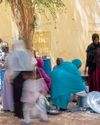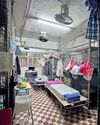
Kabatoff, a member of a pacifist sect of Russian immigrants known as the Doukhobors, was whisked from one location to another. Eventually she was hidden in a tunnel under her family home in the town of Krestova, British Columbia.
"And then one morning, there was screaming and hollering in the neighbourhood," said Kabatoff, now 78. "The next thing I saw was somebody standing with black pants with a yellow stripe. They'd found us. I still can't deal with cops to this day."
Kabatoff and nearly 200 other children from the group were sent to a residential school, where the government set about stripping away their Doukhobor identity. Few spoke English, but Russian was banned.
Some experienced mental, physical and sexual abuse degradations that mirrored the experience of the 150,000 Indigenous children forcibly converted to Christianity, given new names and prohibited from speaking their native languages in government and church-run residential schools.
This story is from the February 09, 2024 edition of The Guardian Weekly.
Start your 7-day Magzter GOLD free trial to access thousands of curated premium stories, and 9,000+ magazines and newspapers.
Already a subscriber ? Sign In
This story is from the February 09, 2024 edition of The Guardian Weekly.
Start your 7-day Magzter GOLD free trial to access thousands of curated premium stories, and 9,000+ magazines and newspapers.
Already a subscriber? Sign In

I love travelling Europe by train, but a joined-up approach is needed
Last August, I took the train from Trieste to Ljubljana, following a route once used by the Orient Express.

How will 2025 turn out? The life of Jimmy Carter offers us a clue Jonathan Freedland
How will we look back on 2025? Or, if that seems too absurd a question to ponder just a few days into the new year, how might we view the first quarter of the 21st century? As it happens, the answer to both questions is the same and it was confirmed by an event that came as the old year faded and the new one began.

15 ways to overcome overwhelm
Readers and wellbeing experts share tips on corralling chaos and avoiding anxiety, from journalling to cherishing nature

Overwhelmed? Here's how to fix it
Modern life is exhausting. Here, Guardian writers explain what they have given up to make space in their schedules and lives from social media to makeup to news addiction. Then, readers and experts offer tips on how to navigate the demands and pressures we all face. First, Emine Saner examines why we are so overwhelmed

Seoul standoff Impeached president fights on despite arrest attempt
South Korean anticorruption officials attempting to arrest the country's suspended president, Yoon Suk Yeol, must know by now what he meant by his repeated vows to \"fight to the end\".

'Don't feed the troll': European leaders hit back at Musk
When the German chancellor, Olaf Scholz, was asked in an interview about the barrage of insults being directed at him and other German leaders by Elon Musk, the world's richest man, his reply was: \"Don't feed the troll.\"

History lessons The two steps that could stop societal collapse
Academic Danilo Brozović says studies of failed civilisations all point in one direction-the need for radical transformation to survive

"Trail angels' The locals offering help and hope to weary hikers
Donna Barkley was weeks into walking New Zealand's longest hiking trail when her strength started to falter. Starting at the northern tip of the country in mid-October, the American hiker had trudged south along vast empty coastlines, over farmland and through dense forests thick with mud.

Community lifeline for millions displaced by civil war
Each day, bowls are set down on the ground in a line outside the community kitchen in Sururab, 40km north of Sudan's capital, Khartoum, for the 350 families who eat there.

Attempt to tackle 'shoebox housing' runs into trouble
Authorities are seeking to fix the problem of tiny, overcrowded housing but critics say new regulations fail to address the worst offenders